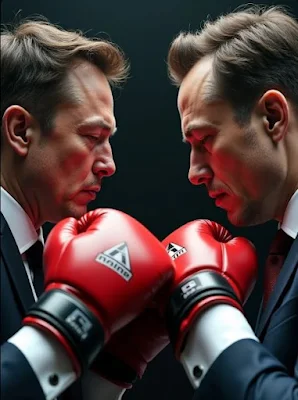The Battle of Tech Titans: Elon Musk Vs Sam Altman In The OpenAI Conflict
As I navigate
the rapidly changing landscape of artificial intelligence, I find myself drawn
to the insights of Sam Altman, the CEO
of OpenAI. His thoughts on AI ethics and
the future of this transformative technology are not just fascinating. They are
essential for understanding the implications of AI in our lives. Recently, the
buzz around Elon Musk's acquisition
offer for OpenAI has added another layer of intrigue.
Let’s dive into
the details of who Sam Altman is, what’s his vision for AI and ethics
considerations of AI advancements, and most importantly, why is he in the news
today?
 |
Elon Musk Vs Sam Altman: The OpenAI Conflict |
Who is Sam Altman? – A Brief Introduction
- Birth:
D.O.B: April 22, 1985, in Chicago, Illinois, and raised in St. Louis, Missouri.
- Family:
- Education:
- Entrepreneurial Journey
1. Loopt: In
2005 (at the age of 19), Altman co-founded Loopt. It is a location-based social
networking app. Loopt was one of the first companies funded by Y Combinator.
This company made revenue of over $30 million in venture capital, before being sold to Green Dot Corporation in 2012 for
approximately $43 million.
2. Y Combinator: After the sale of Loopt, Altman joined Y Combinator as a part-time partner in 2011. He became president of Y Combinator in 2014. Under his leadership, this company supported numerous successful startups, including Airbnb, Dropbox, and Reddit.
3. OpenAI:
In December 2015, Altman co-founded OpenAI. It is a nonprofit organization
focused on ensuring that artificial general intelligence (AGI) benefits all of
humanity. He became the CEO in 2019.
Sam Altman as the Leader of AI Ethics
Sam Altman has
emerged as a pivotal figure in the AI community, advocating for responsible
development and deployment of artificial intelligence. His commitment to
ethical practices is evident in several key areas:
1. Transparency and
Accountability for Ethical System:
Altman emphasizes the need for transparency in AI systems. He believes that developers should be held accountable for the outcomes of their technologies. This will ascertain that ethical considerations are integrated from the start, to ensure trust and prove to be beneficial for humanity.
2. Collaboration with
Governments for better Regulation
Sam
Altman calls for a collaborative approach between tech companies and
governments to establish regulations that promote ethical AI practices. This
partnership is crucial for balancing innovation with public safety.
The Future of AI: Insights from Sam Altman
Looking ahead,
Altman’s predictions for the future of AI are both optimistic and cautionary:
- Job Transformation:
- Ethical Development:
- Long-term Vision:
Latest News: Elon’s CONFLICT
with Sam Altman for OpenAI
On 10th
February 2025, Elon Musk made headlines showing interest in OpenAI - the organization behind ChatGPT.
·
Nature of the offer:
The offer is aimed at purchasing "all assets" of OpenAI, which
operates as a nonprofit organization.
·
Motivation
behind the Offer:
Elon Musk, a co-founder of OpenAI, has voiced concerns that the organization
has strayed from its original mission of being a safety-focused entity. He
argues that the current direction prioritizes profit over ethical
considerations. This bid has been described as a hostile takeover attempt,
aimed at gaining control over the organization that Musk co-founded.
· Investor Backing: Musk's bid is supported by xAI, i.e. his own AI venture. He also has several other investment firms (including one led by Joe Lonsdale, co-founder of Palantir). This backing suggests a strong financial foundation for the acquisition attempt.
OpenAI's Response:·
CEO's
Response:
Sam Altman, the CEO of OpenAI, has publicly stated that the board will reject
Musk's offer. He emphasized that OpenAI is committed to its restructuring
plans, which aim to transition towards a more sustainable model while
maintaining its core values. Altman humorously suggested that
“If Musk is interested in
acquisitions, he could consider selling X (formerly Twitter) for $9.74 billion instead.”
Later today, On February 11, 2025 at the AI summit in Paris, Sam Altman replied to him in an interview saying that "OpenAI Not for Sale"
Adding more fuel to the fire, Altman further says: "I Wish He'd Compete By Building a Better Product".
Musk's Retaliation- Replying to Comments:
Following
Altman's rejection of the bid, Musk took to social media, labeling
Altman a "swindler" and coining the nickname "Scam
Altman".
 |
| Elon Musk calling Altman: Swindler |
 |
| Elon Musk reply to comments, targeting Sam Altman on Twitter (1) |
 |
| Elon Musk Reply to comments, targeting Sam Altman on Twitter (2) |
Musk's comments have sparked significant media attention and public discourse regarding the future of OpenAI and the ethical implications of AI development.
Implications for AI
Development:
As both figures
navigate their respective positions, the outcome of this dispute will likely
shape the future of AI development and governance.
· Restructuring Plans: OpenAI has been working on restructuring itself away from its nonprofit status to better compete in the rapidly evolving AI landscape. This transition is seen as essential for accessing the capital needed for innovation.
· Legal Background: Musk has had a contentious relationship with OpenAI, having previously sued the organization over its restructuring plans. Although he dropped the suit, he has since re-filed it, indicating ongoing tensions.
Conclusion:
Sam Altman's insights on AI ethics and the future of artificial intelligence are crucial as we navigate the complexities of this rapidly evolving field. With the recent developments surrounding Elon Musk's acquisition offer for OpenAI, the conversation around ethical AI practices has never been more relevant. The outcome of this bid could significantly impact the future of AI development and governance. If successful, Musk's acquisition could lead to a shift in OpenAI's operational philosophy and its approach to AI ethics. As we look to the future, it is essential to prioritize ethical considerations and foster collaboration between tech leaders and policymakers to harness the full potential of AI for the greater good.

.png)
